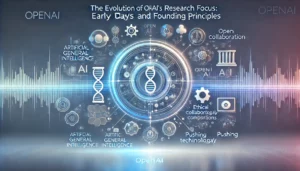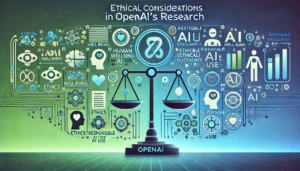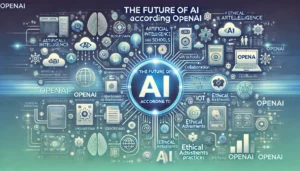OpenAI: Beyond the Buzzwords – A Deep Dive into AI Research

OpenAI is more than just a name in the tech world; it’s a powerhouse of innovation in artificial intelligence. This article delves into OpenAI’s journey, its groundbreaking work, and its vision for the future. From its humble beginnings to its current status as a leader in AI research, OpenAI has continuously pushed the boundaries of what’s possible.
Key Takeaways
- OpenAI has evolved from its early days to become a leader in AI research.
- The organisation has made significant contributions to natural language processing with models like GPT-3 and GPT-4.
- Ethical considerations, such as bias and fairness, are central to OpenAI’s research.
- OpenAI’s generative models are transforming creative industries but come with challenges.
- Collaborations and partnerships play a crucial role in OpenAI’s advancements.
The Evolution of OpenAI’s Research Focus
Early Days and Founding Principles
In the beginning, OpenAI was founded with a clear mission: to ensure that artificial general intelligence (AGI) benefits all of humanity. We believe in the power of open collaboration and transparency. Our early research focused on understanding the fundamental principles of AI and how it could be developed safely and ethically. We aimed to push the boundaries of what was possible while keeping ethical considerations at the forefront.
Key Milestones in AI Development
Over the years, they have achieved several key milestones that have shaped the field of AI. From the development of the first generative models to the creation of advanced natural language processing systems, our journey has been marked by significant achievements. One of our most notable milestones was the release of GPT-3, which set a new standard for language models. These milestones have not only advanced the field but also demonstrated the potential of AI to transform various industries.
Current Research Directions
Today, their research is more diverse and ambitious than ever. They are exploring new frontiers in AI, including reinforcement learning, unsupervised learning, and multi-modal models. Our goal is to develop AI systems that are not only powerful but also safe and aligned with human values. They are also focusing on addressing the ethical challenges associated with AI, such as bias and fairness. By continuing to innovate and collaborate, we aim to drive positive change and shape the future of technology.
OpenAI’s Contributions to Natural Language Processing
OpenAI has made significant strides in the field of Natural Language Processing (NLP). Our transformative models, such as GPT-3 and GPT-4, have set new benchmarks in the industry. These models are not just about generating text; they understand and interpret human language in ways that were previously unimaginable. This has revolutionised how we interact with machines.
Transformative Models like GPT-3 and GPT-4
GPT-3 and GPT-4 are at the forefront of our NLP advancements. These models can generate human-like text, answer questions, and even create poetry. They are powered by AI and have been trained on diverse datasets, enabling them to understand context and nuance. This makes them incredibly versatile and powerful tools for various applications.
Applications in Real-World Scenarios
Our NLP models are used in a wide range of real-world scenarios. From customer service chatbots to content creation, the possibilities are endless. For instance, sentiment analysis, a technique that uses NLP to determine the emotion expressed in a piece of text, is often used in social media monitoring and customer feedback analysis. This helps businesses understand their customers better and improve their services.
Future Prospects in NLP
The future of NLP is bright, with many exciting developments on the horizon. They are continually working to improve our models and make them more efficient and accurate. Their goal is to push the boundaries of what is possible with NLP, making it an integral part of various services offered by businesses worldwide.
OpenAI’s groundbreaking work in NLP is paving the way for a future where machines can understand and interact with humans more naturally and effectively.
Ethical Considerations in OpenAI’s Research
At OpenAI, they are deeply committed to ensuring that our AI technologies are developed and used ethically. This commitment is central to our mission and guides all our research and development efforts. They believe that AI should prioritise human well-being and be a force for good in society.
Bias and Fairness in AI
One of the key ethical challenges in AI is ensuring fairness and reducing bias. AI systems can unintentionally perpetuate existing biases present in the data they are trained on. They work tirelessly to identify and mitigate these biases to ensure our AI models are fair and inclusive. This involves rigorous testing and continuous improvement of our models.
Transparency and Accountability
Transparency is crucial in building trust in AI systems. They strive to make our research and methodologies as transparent as possible. This includes publishing our findings and being open about the limitations and potential risks of our technologies. Accountability is also a key aspect, and they take responsibility for the impact of our AI systems on society.
Collaborations for Ethical AI
They believe that collaboration is essential for advancing ethical AI. They partner with academic institutions, industry leaders, and global organisations to address the ethical challenges posed by AI. These collaborations help us stay at the forefront of ethical AI research and ensure that our technologies are developed responsibly.
Thier commitment to ethical AI is unwavering. They are dedicated to creating AI technologies that are fair, transparent, and accountable, and they will continue to work with our partners to achieve this goal.
OpenAI’s Role in Advancing Generative AI
Breakthroughs in Generative Models
Generative AI, or Gen-AI, is reshaping technology and creativity. Unlike traditional AI, which handles predefined tasks, generative AI creates new content like text, images, music, and videos. This diversity highlights the transformative influence of generative AI across various domains, shaping the future of technology and fostering new ways for creative expression.
Impact on Creative Industries
Generative AI is not just a tech buzzword; it’s the frontier of digital creativity and innovation. It has a profound impact on creative industries, offering boundless opportunities for artists, musicians, and filmmakers. By automating parts of the creative process, it allows creators to focus on what they do best: innovating and expressing their unique visions.
Challenges and Limitations
With great power comes great responsibility. The rise of generative AI brings ethical questions to the forefront. Who owns AI-generated art? How do we address biases in the data? These challenges require us to navigate this new era thoughtfully, ensuring that the future of generative AI is ethical, responsible, and inclusive.
As we explore the possibilities of generative AI, we must also consider its limitations and strive for a balanced approach that maximises benefits while minimising risks.
Collaborations and Partnerships
Academic Collaborations
They have always believed in the power of collaboration. Our partnerships with top universities around the world have been instrumental in advancing our research. These collaborations allow us to tap into a vast pool of knowledge and expertise, fostering innovation and pushing the boundaries of what is possible in AI.
Industry Partnerships
Our industry partnerships are equally important. By working with leading companies, they can apply our research to real-world problems, creating solutions that have a tangible impact. These partnerships also provide us with valuable insights into the needs and challenges of different industries, helping us to tailor our research accordingly.
Global Initiatives
They are also involved in several global initiatives aimed at promoting the responsible use of AI. These initiatives bring together stakeholders from different sectors to address the ethical and societal implications of AI. By participating in these initiatives, we can ensure that our research is aligned with the broader goals of the global community.
Our collaborations and partnerships are a testament to our commitment to advancing AI in a responsible and impactful way.
In summary, our collaborations and partnerships are a key part of our strategy to grow our business and make a positive impact on the world. Whether it’s through academic collaborations, industry partnerships, or global initiatives, they are always looking for ways to push the boundaries of what is possible in AI.
OpenAI’s Approach to AI Safety
They are deeply committed to ensuring the safety of AI technologies. Our research focuses on creating systems that are not only powerful but also safe for widespread use. Safety is our top priority. They work on developing methods to make AI systems more robust and less prone to errors. This includes studying how AI can fail and finding ways to prevent these failures.
To mitigate risks, they employ a variety of strategies. One key approach is to conduct thorough testing and validation of our AI models. They also engage in continuous monitoring to identify and address potential issues before they become significant problems. Additionally, they collaborate with other organisations to share knowledge and best practices, ensuring a collective effort towards safer AI.
Our long-term goals include creating AI that can understand and align with human values. They aim to develop systems that can make decisions in ways that are beneficial to society. This involves ongoing research and collaboration with experts in various fields to ensure that our AI technologies evolve in a safe and ethical manner.
Our commitment to AI safety is unwavering. They believe that by prioritising safety, we can harness the full potential of AI to benefit humanity.
The Impact of OpenAI on Various Industries
Healthcare Innovations
In healthcare, OpenAI’s technologies are making a significant difference. From improving diagnostic accuracy to personalising treatment plans, AI is transforming patient care. Real-world case studies show how AI can predict patient outcomes and streamline hospital operations. This not only enhances patient experiences but also reduces costs.
Financial Services
The financial sector is leveraging AI to detect fraud, manage risks, and provide personalised financial advice. OpenAI’s models help in analysing vast amounts of data quickly and accurately. This leads to better decision-making and more secure financial transactions. The impact of AI in finance is profound, offering both efficiency and security.
Retail and Customer Service
In retail, AI is revolutionising the shopping experience. From personalised recommendations to efficient inventory management, OpenAI’s solutions are enhancing both customer satisfaction and operational efficiency. Retailers can now predict trends and manage stock levels more effectively, ensuring that customers find what they need when they need it.
OpenAI’s innovations are not just about technology; they are about improving lives and businesses across various sectors.
OpenAI’s Open-Source Contributions
Popular Open-Source Projects
They have always believed in the power of open-source. By sharing our work, we enable others to build upon it, fostering innovation and collaboration. One of our most notable projects is the GPT series, which has revolutionised natural language processing. Our models have set new benchmarks in the field, demonstrating the potential of AI when shared openly.
Community Engagement
Engaging with the community is crucial for them. They regularly host workshops and webinars to discuss our latest research and gather feedback. This two-way communication helps us improve our projects and ensures they meet the needs of users. They also encourage contributions from the community, making our projects more robust and versatile.
Benefits of Open-Source AI
Open-source AI offers numerous benefits. It promotes transparency, allowing anyone to inspect and understand the workings of our models. This openness helps build trust and ensures that our AI technologies are used responsibly. Additionally, it accelerates the pace of innovation, as developers worldwide can experiment with and improve upon our work. By embracing open-source, they aim to create a collaborative environment where technology serves the greater good.
The Future of AI According to OpenAI
At OpenAI, they see a future where artificial intelligence goes beyond being just a buzzword. It will become a key part of our daily lives. By working together with different industries and schools, they aim to push AI research to new levels that help everyone. This teamwork speeds up new tech and makes sure AI solutions are fair and good for society.
As they move through the complex world of AI, they stay true to their goal of making positive changes with new and ethical advancements. They are on a journey with OpenAI Assistants, and we will see amazing new things that will change both technology and society.
The world of AI is always changing, and OpenAI is leading the way with new ideas. One new trend is mixing AI with other new tech like blockchain and the Internet of Things (IoT). This opens up new ways to keep data safe and connect things easily. They are committed to ethical AI practices that put people first. By being open, fair, and inclusive in our AI work, they set a good example for others to follow. This way, technology can be a force for good in the world.
Educational Initiatives by OpenAI
Training Programmes and Workshops
We offer a variety of training programmes and workshops designed to help individuals and organisations understand and utilise AI technologies. These sessions range from beginner to advanced levels, ensuring that everyone can benefit. Our goal is to make AI accessible to all.
Resources for Developers
OpenAI provides a wealth of resources for developers, including comprehensive documentation, tutorials, and code examples. These resources are designed to help developers integrate AI into their projects seamlessly. Interactive tools and community forums also offer additional support.
Public Awareness Campaigns
We believe in the importance of educating the public about AI. Our public awareness campaigns aim to demystify AI and highlight its potential benefits and risks. Through these efforts, we hope to foster a more informed and engaged society.
OpenAI Assistants are revolutionising how students access information and interact with educational content. By offering personalised tutoring sessions, assisting with research tasks, and providing instant feedback on assignments, these AI entities are reshaping the educational landscape.
OpenAI’s Vision for Ethical AI
Principles Guiding Ethical AI
At the heart of OpenAI’s mission is a strong commitment to ethical AI practices. They prioritise human well-being and ensure our technologies are used responsibly. By setting clear guidelines, they aim to lead by example in the tech industry. Our focus on transparency, fairness, and inclusivity helps pave the way for a future where technology benefits everyone.
Case Studies of Ethical AI in Action
We have numerous examples of how ethical AI can make a positive impact. From healthcare to education, our AI solutions are designed to be fair and unbiased. These case studies highlight the importance of ethical considerations in AI development. They also show how we can address challenges like bias and privacy concerns effectively.
Future Ethical Challenges
The future of AI holds many promises, but it also comes with challenges. Ethical considerations will continue to be a major focus as we navigate issues like AI ethics, privacy, and bias. Our commitment to responsible AI development sets a standard for the industry. We believe that by emphasising transparency and accountability, we can create a future where AI serves as a force for good.
As we move forward, our goal is to ensure that AI technologies are developed and deployed in ways that are ethical, fair, and beneficial to all. This is not just a vision but a responsibility we take seriously.
OpenAI is committed to creating AI that is ethical and beneficial for everyone. They believe in transparency, fairness, and safety in AI development. To learn more about their vision and how it can impact you, visit our website today.
Conclusion on OpenAI
In conclusion, OpenAI stands as a beacon in the vast sea of artificial intelligence, moving beyond mere buzzwords to deliver tangible advancements. By fostering collaboration and ethical practises, OpenAI is not just shaping the future of AI but also ensuring it benefits society as a whole. As we navigate through this AI-driven era, understanding the core principles and real-world applications of AI will empower us to make informed decisions and embrace the transformative potential of this technology. The journey of AI is just beginning, and with pioneers like OpenAI leading the way, the future looks promising and exciting.
Frequently Asked Questions
What is OpenAI?
OpenAI is a research organisation that focuses on developing and advancing artificial intelligence in a safe and beneficial manner.
When was OpenAI founded?
OpenAI was founded in December 2015.
What are some of the key milestones in OpenAI’s development?
Some key milestones include the creation of the GPT-3 and GPT-4 models, advancements in natural language processing, and significant contributions to AI safety research.
How does OpenAI contribute to natural language processing?
OpenAI has developed transformative models like GPT-3 and GPT-4, which have been used in various applications such as chatbots, content creation, and language translation.
What ethical considerations does OpenAI take into account?
OpenAI focuses on bias and fairness in AI, transparency, and accountability, and collaborates with other organisations to ensure ethical AI development.
What industries have been impacted by OpenAI’s research?
Industries such as healthcare, financial services, and retail have seen significant innovations due to OpenAI’s research.
Does OpenAI collaborate with other organisations?
Yes, OpenAI collaborates with academic institutions, and industry partners, and participates in global initiatives to advance AI research.
What is OpenAI’s approach to AI safety?
OpenAI conducts safety research, works on mitigating risks, and sets long-term safety goals to ensure the responsible development of AI.
Author
Search Blog
Free PPC Audit
Subscribe to our Newsletter
The Voices of Our Success: Your Words, Our Pride
Don't just take our word for it. With over 100+ five-star reviews, we let our work-and our satisfied clients-speak for us.
"We have been working with PPC Geeks for around 6 months and have found Mark and the team to be very impressive. Having worked with a few companies in this and similar sectors, I rate PPC Geeks as the strongest I have come across. They have taken time to understand our business, our market and competitors and supported us to devise a strategy to generate business. I value the expertise Mark and his team provide and trust them to make the best recommendations for the long-term."
~ Just Go, Alasdair Anderson



